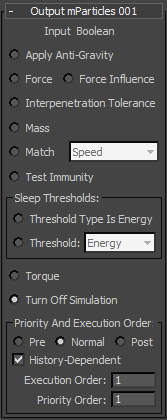The Input mParticles suboperator is for sending data output to the MassFX engine when creating custom Particle Flow operators. This feature is intended for use with the Data operators.
Interface

- Apply Anti-Gravity
- This Boolean data channel defines, on a per-particle basis, which particles can be excluded from the gravity force.
- Force
- Provides direct control over the forces applied to a particle, letting you modify the force applied to a particle without using a mParticles Force operator in the flow.
- Force Influence
- Defines an influence parameter for a mParticles Force operator that follows the Data operator in the event. Note: In order to use these data, the mParticles Force operator must use Script Wiring (right-click the mParticles Force operator and choose Use Script Wiring), and Influence Parameter Wiring on the Script Wiring rollout must be set to From Data Operator.
- Interpenetration Tolerance / Mass
- Use these options to define Collision Shape Interpenetration Tolerance and particle mass values on a per-particle basis. If these data change from frame to frame, then particle mass/tolerance value will be adjusted continually.
- Match
- Writes different check box values defined by a mParticles Switch operator. The choices are Position, Rotation, Speed, Speed Limit, Spin, and Spin Limit.
- Test Immunity
- Writes Boolean values used by mParticles tests (mParticles Collision, mParticles InterCollision, and mParticles Glue) to suspend particles in their current event, even if they test as True and would normally be redirected to the next event.
- Sleep Thresholds
- Writes sleep threshold values for use by the mParticles World driver.
- Torque
- Similar to the Force option (see preceding), writes the torque value for use by an Output mParticles suboperator.
- Turn Off Simulation
- Writes whether the simulation is off for a particle—in effect, its kinematic status for use by a mParticles Switch operator.
The History-Dependent and Execution/Priority Order settings at the end of the Output mParticles rollout are the same as with any regular Output suboperator; for details, see Priority and Execution Order.